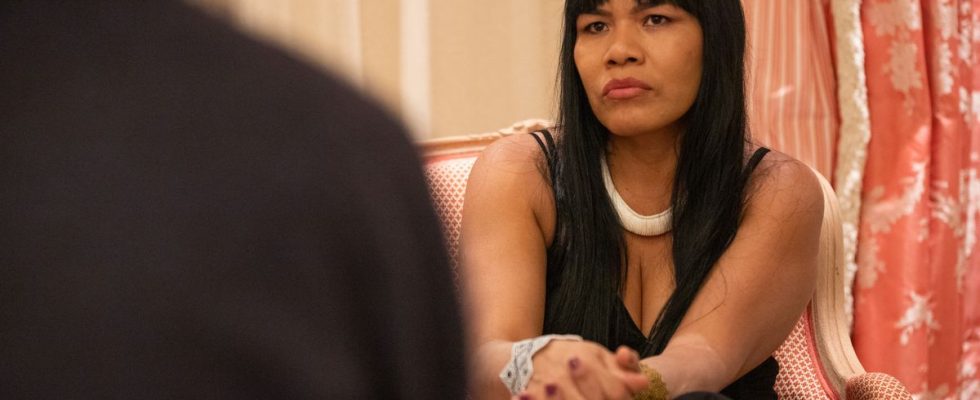When she arrives, this December 10, in the white fleece room of the Le Meurice hotel, in the 1st arrondissement of Paris, the contrast is immediately striking. Dressed all in black, straight hair, ebony black eyes, Watatakalu stands out with the Louis XV style furniture. A symbol of the struggle of indigenous women, the Brazilian has held interviews, official meetings and conferences since her arrival in the capital three days earlier, to warn of the decline of the Amazon rainforest and the impacts of deforestation in her region. native of Haut Xingu. “This is the first time that we have given the floor to a woman to talk about saving the Amazon and to carry the voice of my people,” she says with pride.
Last May, Watatakalu made the headlines of many media outlets around the world. She had then just been called by the great Kayapo chief, Raoni Metuktire, 91 years old, to join the very tight – and very masculine – ranks of the delegation which accompanies him on his biannual international tours. “I am the second woman to have been invited by Raoni to join his delegation. And I am the one who will stay,” she announces, determined.
At 41, Watatakalu is part of this new generation capable of blending into any culture, speaking Portuguese fluently in addition to his native dialect. And skilled enough to speak to the “white man”, says the Kayapo chief of her, at her side for this umpteenth trip to France. “She has all the potential to fight with me, and that’s why I chose her,” explains Raoni, recognizable, among other things, by the impressive labret that adorns her lower lip.
The voice of Amazonian women
Now part of the Raoni fight that he has been carrying for more than thirty years, Watatakalu has also added to his bow the very sensitive issue of the fight of indigenous women. “Part of my people, the Yawalapiti, were very scared when I agreed to leave with Raoni, because I talk a lot, I have no filter. And people from my tribe didn’t want me to publicize certain things,” she says.
“Things” about the condition of yawalapiti women, among others. Violence from their own people but also from that of the settlers against them. And what they now refuse to accept, within a patriarchal indigenous society that is nevertheless more open to the world today.
“For a long time, we, the women of the Amazon, have listened and observed. But we were not allowed to speak. However, we are very active in our territory, we protect the forest, we take care of the fields. Despite everything, we have enormous power! And obviously, men don’t really like it when we talk about all that,” she explains, with a defiant look.
A new generation on the move
Within the delegation of representatives of the Amazon abroad led by the cacique Raoni, Watatakalu will also have to deal, in the coming years, with the leader of the Yawalapiti, also his cousin, named Tapi, and Raoni’s nephew, Jabuti , brought to succeed him. An association that seems to delight her: “With Raoni and his relatives, we have family relationships. With Jabuti, we are the new generation, and we must move forward together, hand in hand. »
Among the hot issues that they will have to bring to the heads of state of the different countries that they will continue to travel: the removal of a law, adopted last May in Brazil, which calls into question the limits of indigenous lands. And the deforestation of the Amazon forest, 38% of which could already have been degraded by human activity and drought, according to a scientific study published in January 2023 in the magazine Science.

Emmanuel Macron was able to speak for the first time with Watatakalu last June. Then again this Monday, at the Palais Chaillot, where the delegation, accompanied by the alliance for the preservation of forests (APF) And the association for the virgin forest (AFV)was invited to join the French president on the occasion of the 75th anniversary of the Universal Declaration of Human Rights.
“These tours allow us to be visible on the international scene. We are then looked at differently. This gives us more value in the eyes of the world. And if the world values us, then we will have more weight at home,” she concludes.

